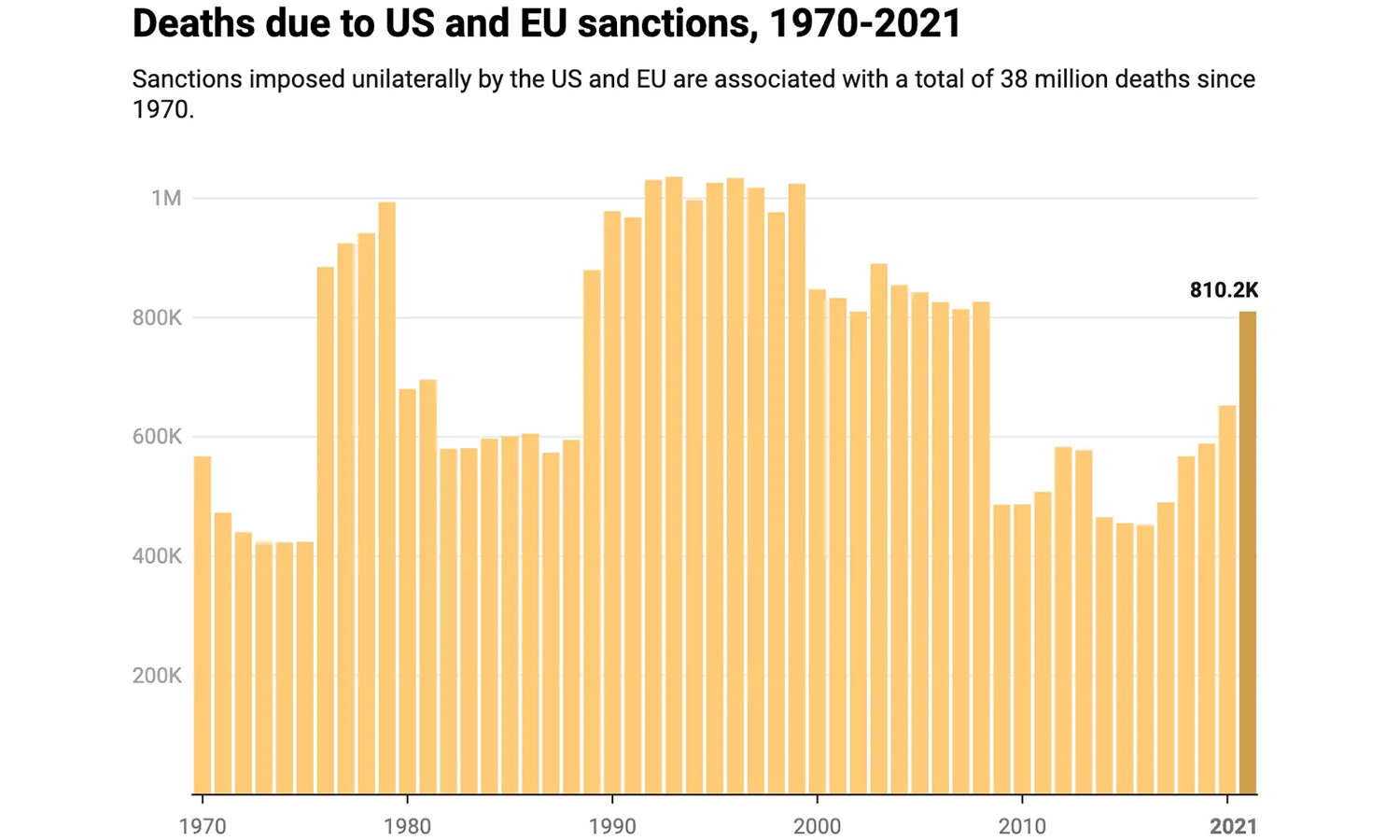Britain is the fifth-largest economy by GDP in the world, a net exporter of foodstuffs, a country using 71 percent of its land to produce food and a signatory to the United Nations’ ‘right to food’ resolution.
Why then, are ordinary Brits relying more and more on food banks and charities to feed themselves and their families? Why are increasing numbers reporting that they are missing meals in order to try and balance their budgets?
Recent research published by the Food Standards Agency (FSA) shows the magnitude of this increasing struggle to fill British working-class bellies:
- Three in every 4 (76 percent) Britons report food costs as being a major concern.
- The number of people using food banks has grown rapidly in just the last year, from 1 in 10 (9 percent) in March 2021 to more than 1 in 6 (15 percent) in March 2022.
- Or to take a longer view, ten years ago the UK had 60,000 food bank users; now, there are 2,173,000.
- More than 1 in 5 Britons (22 percent) are now skipping meals or reducing meal size owing to affordability.
These figures reveal Britain’s mounting food crisis. When this is added to the spiralling costs of heating, travel and cooking, to rising levels of unemployment and real cuts wages as a result of rampant inflation, the picture becomes even grimmer.
The market is the problem
The picture painted by the figures above is of millions of people finding it difficult to access or afford food. Yet, absurdly (and tragically), there is no shortage of foodstuffs – or, indeed, wealth – in Britain.
Britain produces enough staples to meet nearly all the population’s requirements, according to the government’s own report on food security in 2021. The country produces 100 percent of the barley and oats, and 90 percent of the wheat British people need; and that is after 7 percent waste during production has been taken into consideration.
So if we are producing enough domestically, why are we having to worry about food costs? One of the absurdities of capitalist relations of production is that not a grain of barley, oat or wheat is produced to meet people’s need – it is not produced for its use value. It is only produced as a commodity, for its exchange value.
This means that food, the output of workers’ labour and British soil, is being produced not to ensure those same workers can eat, but for sale on the market. The market doesn’t weigh up production against the needs of the population, it demands that production makes a profit.
Wheat, for example, has seen its market price double in the space of two years. This has been attributed to many causes: the pandemic, distribution issues, or rising costs of inputs – fertilizers, fuel and equipment. These increases are passed onto consumers, very often on just the excuse of a predicted price rise in costs for the capitalists.
The opposite cannot be said when the going is good for the capitalist. Sudden falls in price are rarely passed on to workers in this era of monopoly, when competition is actually very limited and the big companies that dominate each sector tend to work together (in cartels) to eliminate small competition and fix prices artificially high. As a result, price changes of many essentials are in one direction only, and those rises hit workers’ wallets hard, always rising faster than our (sometimes drastically) lagging wages.
So who can stand in the way of these market forces to regulate prices of vital necessities like food and fuel? The government?
FSA chair Professor Susan Jebb says: “In the face of the immediate pressures on people struggling to buy food, food banks are playing a vital role in our communities. We are urgently working with industry and other major donors, and food bank charities, to look at what more we can do together to ensure that food which is safe to eat can be redistributed to people who can benefit from this support.
“Food banks can be a trusted lifeline in the short term, but governments and regulators must also look more widely at other ways to enable people to reliably access safe and healthy food in the long term.”
The professor appeals to ‘regulators’ and the government, ignoring the fact that the ‘regulators’, despite a thin facade of ‘independence’, are totally beholden to big capital, directly or indirectly controlled by business interests. So then what are the solutions that our current system can offer?
Subsidising profits for the monopolies
An example of the present government’s ‘efforts’ to keep costs down has been to pay capitalists to keep producing (ie, to subsidise profits) at a time when there is little or no profit to be had. Subsidies and one-off payments of eye-watering sums to ‘persuade’ the bourgeoisie to give some attention to human need – even if only for a moment.
A rise in gas prices (gas being an essential raw material in fertiliser production) caused US-owned fertiliser producer CF Industries to halt production. Not that gas wasn’t available, mind you, but the price increase meant the company could no longer produce at a cheap enough price to compete on the world market. So the British government gave CF Industries tens of millions of taxpayer pounds to restart production. Nice work if you can get it!
A successful intervention by our rulers, right? Hardly. This was a temporary (and extremely expensive) sticking-plaster solution that once again funnelled money taxed from workers into the pockets of the monopoly capitalist class.
Less than a year after receiving this bonanza, the company is shutting a plant in Cheshire, not only restarting the panic for much-needed chemicals, but casting hundreds more workers onto the scrapheap of unemployment, with all its attendant woes – including, of course, food insecurity.
This is but one example of the capitalist system’s inability to address even the most basic needs of its workers.
Food as a right
Food, it goes without saying, is a requirement for life. Many calls have been made for nationalisation of other essential services and products (railways, water, utilities), but food is rarely included on the list.
Meanwhile, there is nationalisation and there is nationalisation. Farmers in Britain are already paid huge subsidies, which are paid per hectare of cleared ground (not for the amount of food they produce!) on the ‘assumption’ that this land will be used for meeting the needs of food production in Britain.
But in conditions of the world market, this subsidy has in fact led to a vast acreage of fields left untilled, their owners finding it more ‘efficient’ (profitable) to passively accrue subsidies than to engage in the risky and expensive business of employing workers to cultivate and harvest crops that are dependent on nature for the right conditions to grow.
As with so many areas of the capitalist economy, the distribution of these subsidies is such that small farms receive very little while having to compete on the market with large farms, accelerating the process of their being assimilated by their larger competitors and the further concentration of Britain’s agricultural land into ever fewer hands.
Even so, British farms do actually produce enough to feed every man, woman and child in Britain. If the government can step in to pay private farmers to produce for the market, could they not do the same to subsidise production aimed at meeting workers’ food needs?
Would full-blown nationalisation, while firmly resisted by our government, press and, of course, the capitalists, solve the problem?
It could certainly bring down prices and enable a measure of planning. But without planning in the whole of the economy, nationalised industries under capitalism are still subject to the anarchy of the market – to rises in gas and fuel prices, for example. Unless all these essentials are being produced for need rather than for profit, the knock-on effects of crisis and inflation would still be felt.
A UK-wide food service would, however, be a vast improvement on our present situation, allowing the state to achieve economies of scale and to ensure that good quality and nutritious food was available at reasonable prices to all workers.
Securing that right
So why isn’t this happening, especially a time of rising food poverty? Essentially, it is because there is a global crisis of capitalist overproduction – too much wealth has been accrued into too few hands, and those exponentially expanding piles of cash are increasingly difficult to reinvest in profitable ways.
This is all that capital cares about – constantly expanding capital into more capital. The irony of such a system is that the more successful it is in doing this, the harder the mission becomes. The world’s masses have been so impoverished they simply don’t create enough ‘demand’ for the goods of expanding capitalist production.
As avenues for profit-making via production disappear, privatisation of any public services all over the globe is proceeding at a breakneck pace and is combining with stock-market gambling and asset (land, artworks, bitcoin …) speculation bubbles to keep the system limping along.
At such a time, the idea of removing essential commodities from the marketplace, denying the possibility to investors of throwing in their vast accumulations of capital and realising corresponding profits from their sale, is simply out of the question as far as our rulers are concerned. The only thing that might change their minds (for a while) is huge and irresistible pressure from the organised working class – backed up by the credible threat of revolution.
Moreover, providing secure and meaningful employment – and thereby reducing the reserve army of labour (ie, the unemployed) – is no part of the capitalists’ plan. This reserve army is necessary to the effective functioning of a market economy – to quickly provide more manpower when business is booming, and to act as a permanent downward pressure on pay and conditions at all times, essentially holding the terrifying threat over the heads of the employed: work on the terms dictated by your exploiters or join your even less fortunate brothers on the dole queue.
At a time like the present, despite the obvious advantages for the workforce and for social peace, true nationalisation (ie, running an industry without the need to make profits) is something our rulers are extremely wary of pursuing. Not only would it remove an avenue of profit-taking from the monopolists, but it would remind workers that anything they rely on for life can only be reliably and affordably provided by removing it from the anarchy of capitalist production.
It is a small step from recognising that this makes sense for one or two essentials to recognising that it makes even more sense for the entire economy.
Only with the levers of industry in the hands of the producers themselves – ie, in the hands of the workers – will we arrive at a situation in which food, heating, housing, healthcare and all the other requirements of a decent and civilised life are available to all.
Meanwhile, freed from the monstrous requirement to pay so much of society’s wealth in tribute to the corporate bloodsuckers, humanity will finally be in a position not only to provide all the essentials of life cheaply and securely, but to begin the socialist mission of unlocking the full potential of all its members.














